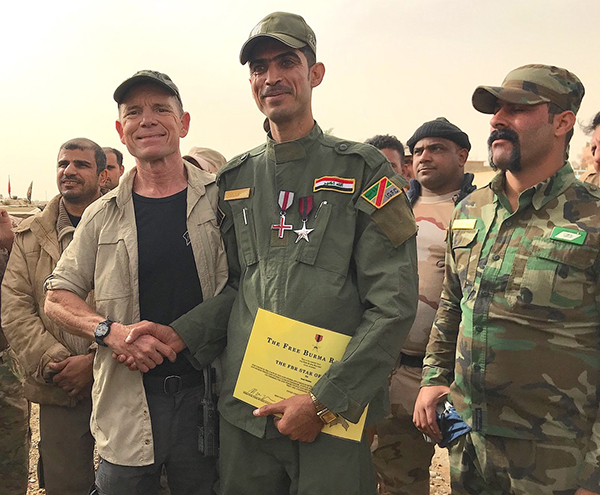Making Friends Across Lines: Iraq Trip Update
2 December 2017
Mosul, Iraq and Irbil, Kurdistan
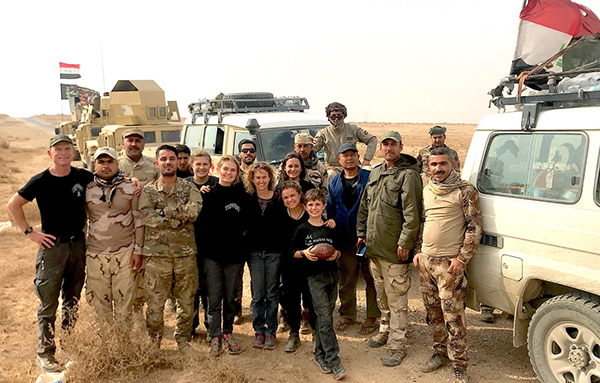
Dear friends,
We went back to Iraq to visit and support our good friends in the Iraqi Army who are still fighting the remnants of ISIS, to follow up on the men, women and children whose lives we helped rescue from the destruction that ISIS wreaked there and to meet good friends in Kurdistan and Sinjar. Thanks for your prayers and support to get us there.
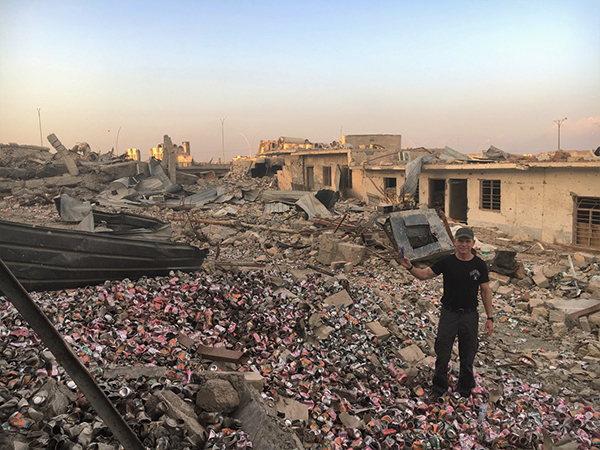
We met with old and new friends in the Iraqi government as well as Kurds, Christians and Yezidis. From these meetings and our observations we have the following recommendations:
1) Keep praying for the people of Kurdistan in northern Iraq, and for all people in Iraq.
2) The US, with Iraqi Government guidance, should try to be friends with the Iraqi Popular Mobilization Units (PMU). These forces are under the Iraqi government and were formed to stop the onslaught of ISIS and liberate occupied Iraq. While they receive support from Iran, most PMU consider themselves independent from Iran and subordinate to the Iraqi government. The PMUs are one of the keys to the future of Iraq and most can be our friends. We worked closely with many of these PMUs in the battle against ISIS and feel that they exist to save Iraq and that they are motivated primarily by their faith and patriotism. While we have heard reports of atrocities we never saw any with the different PMUs we worked with. It is true that Iran wants to expand its power in Iraq and the Middle East and gain a land bridge to the Mediterranean Sea. It is also true that they want to use the PMUs to further their objectives and they encourage an anti-American attitude. However the US should not paint the PMUs with a broad brush but find those we can be friends with such the Badr organization, which is one of the largest. The leader of the Badr PMU, Hadi Al Amiri, whom we met in Baghdad, had this to say about Iran: “We feel a spiritual connection with Iranian people since the Islamic revolution that removed the Shah. Also, Iran helped us when we were in great danger from ISIS. We do not push away people who have helped us. We share a 1,400 kilometer border with Iraq, what do you want us to do, move our country? Finally, we will not be dominated by Iran or the United States but we want to be friends with both.” The US should continue working alongside all in Iraq: the Iraqis, Kurds, Yezidi, Christians, Turkmen and other minorities to help rebuild Iraq.
3) The United States needs to clearly take both sides in the conflict between the Kurds and Iraqis. Saying ‘we are not taking sides’ means that whoever is stronger will win and signals to others, such as Iran, that we really do not know what to do, nor will we always act with honor. Half commitment means we will have full trouble and no ability to resolve any conflicts. Full commitment means we will use all appropriate resources to help find solutions. Full commitment also means we want to be friends who love the Iraqis, Kurds and all in Iraq. We need to find ways to help find compromise and our role in this should be one of cooperation, not domination.
4) The Kurds have developed one of the most free societies in the Middle East, have been loyal friends (no American soldier was killed in Kurdistan prior to ISIS), have borne more than their share of the fight against ISIS for the world, and are the largest people group without a country in the world. At the same time the Iraqis have been our friends and partners in the same fight against ISIS, we share a long history, and we need to support them – but without abandoning the Kurds. When we abandon people, it is not only dishonorable but others will come to fill the void. We heard from our Kurd friends many times on this trip: “We should have never trusted the Americans, we should have been close to the Iranians and Russians instead.” “We wanted to be close to America but you pushed us away and abandoned us. What can we do?”
The US should not trade a long-term relationship with the Kurds for a short-term relationship with the Iraqis. We need a long-term relationship with both, and this is only possible by honoring our promises, defending our friends, and putting ourselves not above but as equals in our relationship with all in Iraq. Our military has done a great job helping to defeat ISIS, and our diplomats in making friends. We need to deepen these friendships and this can only be done if we come together as equals to find a solution agreeable to all.
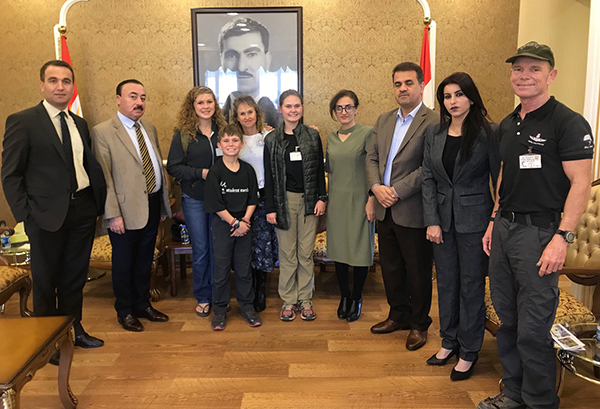
Trip Report:
The following is a trip report with more details of meetings with Kurd and Iraqi leaders. The main purpose of this mission to Iraq was to visit our friends and reconnect after the campaigns against ISIS, find and help civilians we had rescued, and continue our help to Iraqis, Kurds and Yezidis. We first went to visit our Kurdish friends in Kurdistan. During the campaign against ISIS, the Kurds liberated hundreds of kilometers of ground from ISIS and took numerous towns and cities – most importantly Kirkuk, a center of oil production for both Iraqis and Kurds. After ISIS was defeated, the Kurds overwhelmingly supported a referendum for independence from Iraq. The Iraqis were angered by this and what they felt was over-reach by the Kurds and forced the Kurds out of Kirkuk and other areas. They also shut down international flights to Kurdistan and began to press the Kurds to turn over their Syrian and Turkish border crossings.
We drove from Irbil to the new/old front line looking over Basheeqa and other towns that the Kurds had won in blood, then lost when the US did not support their call for independence nor stop the Iraqi advance. On the Iraqi side it is felt that the Kurds asked for and took too much. On the Kurd side it is felt they were abandoned and lost what was rightfully theirs. For example, Saddam Hussein had earlier driven Kurds out of Kirkuk and other historical lands and now the Kurds had reclaimed these – only to lose them again.

On the new front we met with Kurd Peshmerga soldiers with whom we had worked for three years; these were bitter, sad but sweet meetings. It was bitter for the Kurds who had just lost so much and sad for both of us because of our friends lost in battle. In the end it was sweet in that we were back together and our bonds of love had only grown deeper. Up at the front positions we met with Kurd generals Alfandi, Nooradin, Mutaa and Bahram – all great leaders with whom we had worked and lived and served closely – and with whom we had lost mutual friends. They were all glad to see us but were disappointed at America. Everywhere we went along the front we heard, “America betrayed us, you did treason to us, we used to be friends but no more.” “Our friendship is broken forever, we cannot trust America.” “I could not eat or sleep for a week after you betrayed us and did not help us in the face of the Iraqi attack.”
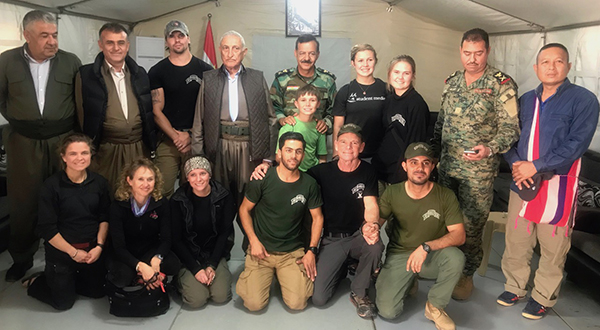
We heard these and other words again and again and could only apologize and pray with them. We told them we felt the US was wrong to abandon them but that we also had friends among the Iraqi Army and PMUs. I had been wounded in battle four times: once alongside the Kurds, twice with the Iraqi Army and once with the PMU. I had lost many friends with each. So with each group we were bonded in love and hoped the US would work with all sides to help find solutions.
After spending the night in a Peshmerga tent next to their trenches at the front, we drove to Mosul to track on some of the injured civilians that we rescued in May and June. We drove through the Kurdish dirt berm that is closed each night and then through the PMU lines and Iraqi Army/Police checkpoints into east Mosul. Here we passed through the ruins of Mosul neighborhoods just beginning to rebuild. Every few blocks were Iraqi police checkpoints and the feeling was still tense. Most of the people here had been under ISIS for three years and many had supported them. As per earlier reports, we met and helped the civilians we had rescued earlier and each reunion was joyful. We spent the night in west Mosul with a family that was not part of the rescues but was a family we had been part of liberating and they had a grandmother who had lost her legs and a little girl who had lost her foot in an airstrike. We spent the night with them, listened to their stories, gave as much help as we could and exchanged contact information so we could be in touch with them in the future.
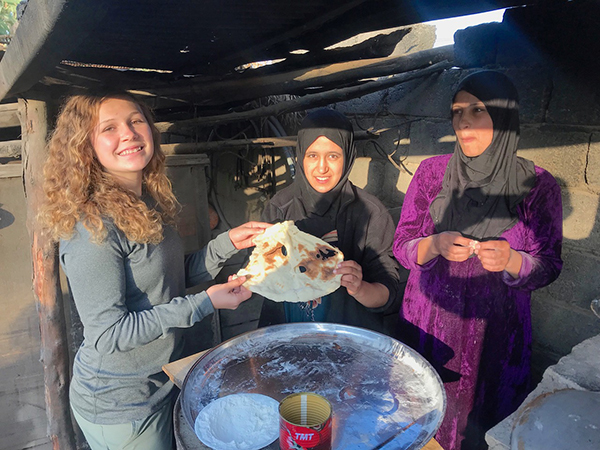
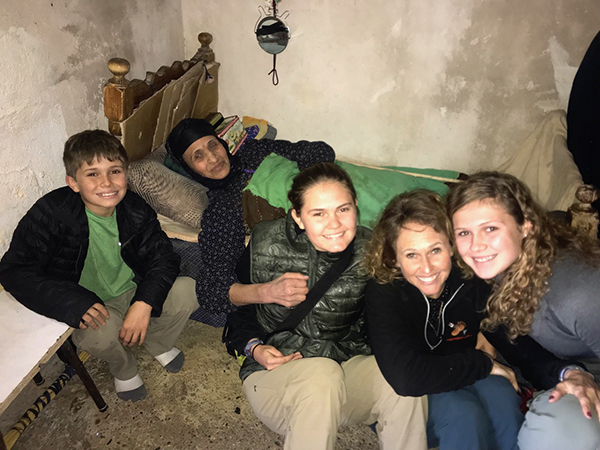
The next morning our destination took us across Mosul – very slow going with more and more vehicles returning, multiple checkpoints and rubble everywhere. A tunnel had been discovered near the place we spent the night and three ISIS had escaped from it and were at large. Every checkpoint was on the lookout, not only for these three ISIS, but the many others known to still be hiding in Mosul. On the outskirts of west Mosul a mortar was fired at us from a hill. It was only one round and landed 300 yards away from us, but showed that ISIS was still around.
Back in Irbil we reunited with Demoa, the little girl we rescued on June 2nd by running behind a Iraqi tank to go help her.
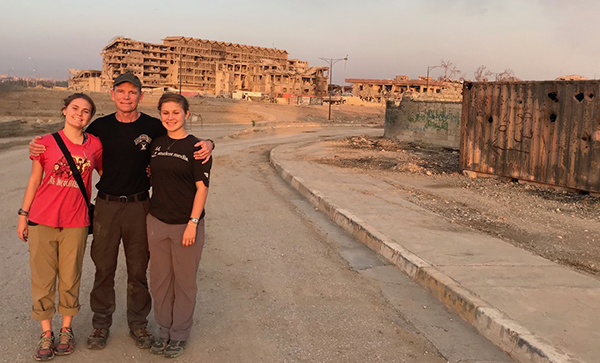
From Irbil we went back to Mosul and on to Sinjar. We had supplies to pick up and had a late start. The road has over 20 checkpoints manned by PMU’s but it was not a problem getting through even though we were traveling at night. Sinjar itself is controlled by a combined force of Iraqi Army, police and PMU. The Kurdish militia from Turkey, the PKK, is also there. One of our Yezidi Rangers runs a clinic there and was in need of medicine and medical supplies, which we delivered. Sinjar was liberated from ISIS in November 2015 and now, in November 2017, we saw very little change. The city is still mostly in ruins and there is no electricity or water service. There is one small elementary school teaching in Kurdish, which started just this month. In charge of the town of Sinjar and surrounding areas is a Yizidi mayor who still lives up on Sinjar Mountain among the thousand of Yizidi IDPs there. Patrolling the town and neighboring area are the Iraqi Army, the Iraqi militia and the PKK. The PKK has grown in strength since last year and I counted five new defensive positions and something I had not seen them have before: armored Humvees mounted with crew-served weapons. We spent two days and a night in Sinjar and gave what support we had. We also reunited with a Yizidi family we had been friends with during the fight to liberate Sinjar and our kids rode their horses and donkey.
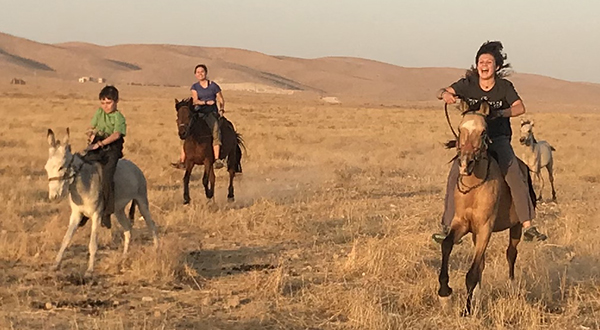
We then drove back to Irbil and the next morning left for Baghdad. The way to Baghdad now is long as we had to go via the Sulimanaya route – first through Kurd checkpoints and then in Iraqi territory through the checkpoints manned by the Iraqi Army, Police and various PMU forces. Most just waved us through but some stopped us and asked for our purpose and names. We were allowed through all, and treated with courtesy. Due to heavy traffic, bad road conditions, two flat tires and the many checkpoint stops it took us 10 hours from Irbil to the Green Zone in Baghdad.
We had no escort but phone calls to Dr. Haitham Al Mayahi cleared up any problem for us. Dr. Haitham is a dual Iraqi and American citizen who is a trusted representative to the US for the Iraqis and the PMUs. He is the political and foreign affairs advisor to Mr. Hadi Al Amiri and is a main coordinator between worldwide media, NGOs and the government of Iraq. Dr. Haitham is one of the key forces of good in Iraq. He holds a PhD in political science and international relations from Howard University in Washington D.C. Dr. Haitham speaks flawless English and understands the nuances of the situation in Iraq. At the Green Zone we were met by Dr. Haitham who took us to meet Hadi Al Amiri, a top leader of the Iraqi Popular Mobilization Units, (PMU) – forces organized to counter ISIS.
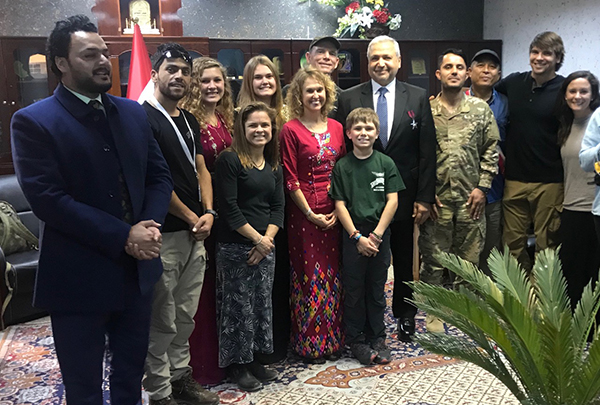
Hadi Al Amiri is a serious-looking former minister of transportation of Iraq who left his post to fight ISIS. He organized the Badr PMU and is known as a brave fighter and brilliant organizer. He told me, “Where you are sitting, US ambassadors and generals have sat as well as leaders from Iran and I tell them all the same thing. ‘We want to be your friends but you will not control us. We need your help but not your domination. We are grateful for all the US help and consider you all to be friends.’” He went on to say that the Iraqi Army and the PMUs would not attack the Kurds, that this was the time to talk and that no further territorial disputes should be resolved by fighting. “The Kurds are part of our Iraqi family and they need their own way but we can work this out together.”
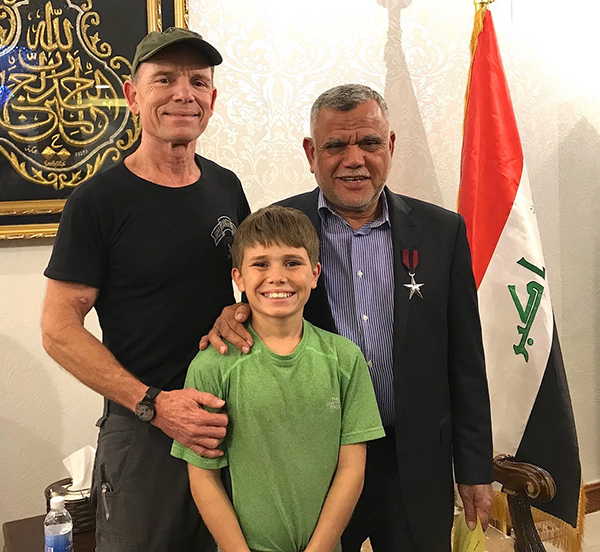
I asked him about Iran and he replied with five main points:
1) We feel a spiritual connection with Iranian people since the Islamic revolution that removed the Shah.
2) Iran helped us when we were in great danger from ISIS.
3) We do not push away people who have helped us.
4) We share a 1,400 kilometer border with Iraq; what do you want us to do, move our country?
5) We will not be dominated by Iran or the United States but we want to be friends with both.
We had dinner together and came away from that meeting feeling we had a new friend.
The next day Dr Haitham arranged a meeting with Dr. Khalid Al-Mulla, one of the top Sunni leaders. He was kindly and serious and welcomed us warmly. He told us he was thankful for our help in Iraq and that he considered America to be a friend. He said that both Sunni and Shia were united to defeat the evil of ISIS but went on to say that ISIS was indeed following the Koran literally but brutally. Thus they were wrong. He said, “Now that ISIS has been defeated we need to reeducate our people, especially our young people. They need to learn how to think and believe on their own and rebuild our country. We need help to do this and now is the time for action not words.”
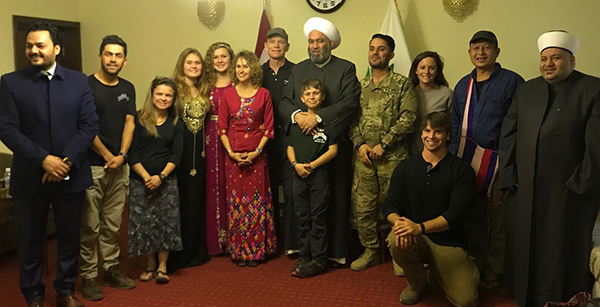
From this meeting Dr. Haitham led us back to the Green Zone to meet with Dr. Walid Al-Hilli, senior adviser to the Iraqi Prime Minister, Mr Abadi. Dr. Walid had been imprisoned by Saddam Hussein and came back to Iraq upon liberation. He is a wise, open-minded man with an excellent command of English. He educated us on Iraqi history and also reassured us that the Iraqis and Kurds would work for a peaceful solution to their problems. “The US is our friend and so is Iran and we want to be able to work with both. We are thankful for your humanitarian help for our people and your part in the liberation of Iraq from ISIS.” We closed our meeting with prayer.
That night we stayed with General Mustafa, the former commander of the Iraqi 36th Mechanized Brigade of the 9th Armored Division, with whom we had served during the Mosul campaign. His brigade had suffered great losses, having started the campaign with 105 BMP armored personnel carriers and over 40 Humvees but finishing with only 12 BMPs and 5 Humvees remaining. He lost over 50% of his strength fighting ISIS. 30 of his troops who were killed were close friends of ours and we felt the loss together. Gen. Mustafa had not only fought and defeated ISIS in his area of operations throughout the campaign, he had helped to provide life-saving food, water and medical care to over 70,000 civilians. We love him and reuniting with him was like being with family. His neighborhood was one of the most dangerous in Baghdad and still is not completely stable with Iraqi Army and police covering numerous checkpoints.


The next day we linked up with the 36th Brigade of the 9th Division and travelled through Fallujah and Ramadi, both heavily damaged but slowly being rebuilt. We continued on to the Syrian border in the vicinity of El Qaim/ Rawa and spent the next three days with the 36th as they moved first along the Syrian border area and then east across to Haditha Dam and north to the destroyed, mostly empty town of Bayji. We distributed medical supplies and funds for food for civilians they expected to find in their next push west. We had a good meeting with General Kasem, the 9th Division commander and a local PMU commander. Most of all we were reunited with old friends and handed out photos and awarded medals for valor and wounds. The next day, the 9th Division launched a sweep west back towards the Syrian border to clear possible remaining ISIS remnants. From Bayji we drove at night to Mosul, again passing through numerous check points with PMU’s controlling the outside of the Mosul and Iraqi Police inside. The west side of Mosul at night is an eerie, dark and destroyed place. There was no one visible walking at night on the main roads, nor did we see shops. At night there were only cars passing through the Iraqi Police checkpoints. Once we crossed the pontoon bridge to the east side, suddenly there were lights, shops open and people walking and shopping. We spent the night with friends in east Mosul and the next day drove through the open berm into Kurdistan. We left grateful for the opportunity to reconnect with old friends and plan together how to help when we return. We are now on missions in Burma but plan to be back in Iraq in February 2018.
Thank you for praying for us, God bless you,
Dave, family and teams
